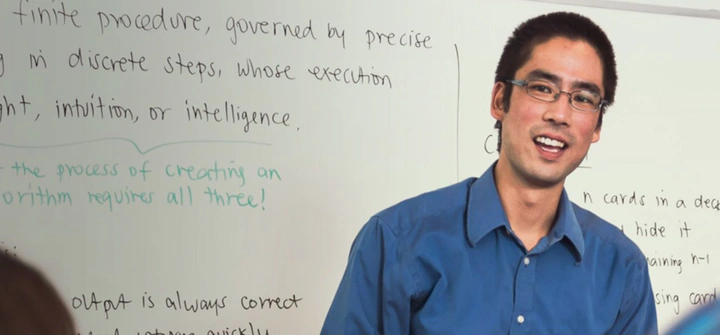Getting to know our BC ambassador Richard Hoshino

We ask a lot of our Callysto team.
These hard-working individuals are building the tools that are helping to bring computational thinking to Canadian classrooms! They’re managing everything from workshop logistics issues, to developing new online textbooks for students and teachers. Rarely do they bask in the glory of finishing the last workshop or textbook release, because they’re already knee-deep planning the next one.
That’s why we are taking a moment to recognize the individual team members that form the Callysto project. In this post, we’ll get to know our lead for all BC teacher workshops a bit better.
What’s your name?
Richard Hoshino
What work are you doing on Callysto?
Callysto Coordinator for British Columbia.
What does that mean in practice?
I get the pleasure of working with BC teachers through our teacher training workshops and in-class presentations, helping them implement the Callysto project in their classrooms.
What do you normally do for a day job?
I work as a mathematics and computer science professor at Quest University Canada in Squamish, BC. I have published numerous articles and books on teaching math and scheduling optimization. I am currently on sabbatical to work with the Callysto team.
Growing up, what was your favourite subject?
Math and computer science. I used to love to find ways to solve problems and understand complex math using computers and code.
How did your career in mathematics begin?
It all started when I was in my Ph.D. program and I was working on these beautiful problems related to scheduling optimization and data exploration. This eventually led me to work with the Canada Border Services Agency on ways to reduce wait times at Canadian border crossings. I also created risk scoring algorithms for marine cargo containers.
I am proud of my work with the Canadian government, as it means that Canadians have shorter wait times at the Vancouver Airport to clear customs. Also, we were able to both locate and apprehend cocaine smugglers who were using cargo ships to smuggle illicit drugs into Vancouver ports.
Why do you love math so much?
I love to use math because there are so many amazing problems to solve. I also like to find ways to use math for good, like with the Callysto project, or through my work as an expert in scheduling optimization. The Callysto project really appealed to me because I get to share my love of coding, computing and teaching with both teachers and students.
What makes the Callysto project special?
I have only been with the project for a few months now, but I have to say it’s the predictive ability and easy-to-use format of the Jupyter notebooks. I’m also hoping teachers and students will see how this tool can fit nicely into the classroom. I love that Callysto uses Python, and can teach students coding and how to use open data to solve real-world problems.
What do you hope the Callysto project will achieve?
I am hoping that we expose enough teachers to the project in BC and across the country to meet our goal of 750 teachers trained by next year. I also hope that teachers will continue to use it as a practical teaching tool in the classroom.
My biggest hope is that teachers will see the amazing capability of Jupyter notebooks. Essentially, we are exposing teachers and students to the world’s most powerful online textbook, which performs complex equations and shares data, all using the Internet. This project is teaching kids the necessary 21st-Century skills of data science, computational thinking, and how to think beyond block coding. These are necessary skills for tomorrow’s workforce.
What’s in your coffee?
I drink black coffee every morning.
What’s your secret talent?
I am really great at mini golf. Not to brag, but I hold the course record in Squamish for the highest mini-golf score. I think it has to do with my love of math and the ability to use geometry to ”˜work the angles’.
Attend one of Richard’s upcoming talks
October 19, 2018 at the 2018 Northwest Mathematics Conference
9:30am – 10:15am
Optimally Scheduling Classes and Exams using Graph Theory
5:00pm – 6:00pm
Ignite! 7 Speakers – 5 minutes each – Immeasurable Inspiration